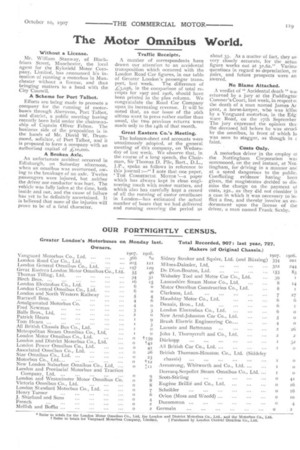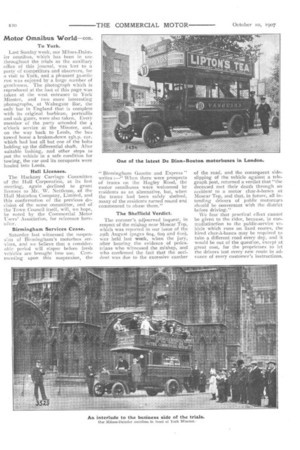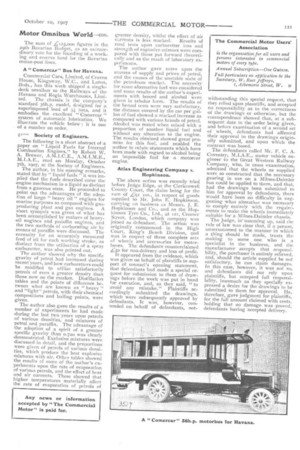The Motor Omnibus World.
Page 7

Page 8

Page 9

If you've noticed an error in this article please click here to report it so we can fix it.
Without a License.
Mr. William Stanway, of Blackfriars Street, Manchester, the local agent for the Ryknield Motor Company, Limited, has announced his intention of running a motorbus in Manchester without a license, and thus bringing matters to a head with the City .Council, A Scheme for Port Talbot.
Efforts are being made to promote a company for the running of motorbuses through Aboravon, Port Talbot, and district, a public meeting having recently been held under the chairmanship of Captain Oliver Felton. The business side of the proposition is in the hands of Mr. David W. Drummond, solicitor, of Port Talbot, and it is proposed to form a company with an authorised capital of L;to,000.
A Broken Axle.
An unfortunate accident occurred in Edinburgh, on Saturday afternoon, when an omnibus was overturned, owing to the breakage of an axle. Twelve passengers were injured, but neither the driver nor conductor was hurt. The vehicle was fully laden at the time, both inside and out, and the cause of failure has yet to be definitely ascertained. It is believed that none of the injuries will prove to be of a fatal character. Traffic Receipts.
A number of correspondents have drawn our attention to an accidental transposition which occurred with the London Road Car figures, in our table of Greater London's passenger trans port, last week. The difference of .4;3,056, in the comparison of total receipts for 1907 and 1906, should have been printed in the plus column. We congratulate the Road Car Company upon its increasing revenue. It will be noted that, as our issue of the 26th ultimo went to press rather earlier than usual, the two previous returns were made only to the t4th of that month.
Great Eastern Co.'s Meeting.
The balance-sheet and accounts were unanimously adopted, at the general meeting of this company, on Wednesday of last week. We observe that, in the course of a long speech, the Chairman, Sir Thomas D. Pile, Bart., D.L., J.P., spoke as follows in reference to this journal :—" I note that one paper,
THE COMMERCIAL MOTOR '—a paper which has always kept in close engineering touch with motor matters, and which also has carefully kept a record of all the running of motor omnibuses in London—has estimated the actual number of buses that we had delivered and running covering the period as
about 33. As a matter of fact, they an very closely accurate, for the actua figure works out at 32.62." Variou! questions in regard to depreciation, re pairs, and future prospects were an svy-ered.
No Blame Attached.
A verdict of "Accidental death " wa! returned by a jury at the Paddingtor Coroner's Court, last week, in respect o, the death of a man named James Ar gent, a horse-keeper, who was killec by a Vanguard motorbus, in the Edg ware Road, on the 27th September The jury expressed the opinion tha; the deceased fell before he was struci. by the omnibus, in front of which h( was seen to stagger, as though in faint.
Costs Only.
A motorbus driver in the employ of the Nottingham Corporation wm summoned, on the 2nd instant, at Nottingham, for driving in a manner and at a speed dangerous to the public. Conflicting evidence having been given, the magistrates decided to dismiss the charge on the payment of
costs, 255., as they did not consider it a case in which it was necessary to inflict a fine, and thereby involve an endorsement upon the license of the driver, a man named Frank Saxby.
Last Sunday week, our Milnes-Daimler omnibus, which has been in use throughout the trials as the auxiliary office of this journal, was lent to a party of competitors and observers, for a visit to York, and a pleasant 50-mile run was enjoyed by a large number of gentlemen. The photograph which is reproduced at the foot of this page was taken at the west entrance to York Minster, and two more interesting photographs, at Walmgate •Bar, the only bar in England that is complete with its original barbican, portcullis and oak gates, were also taken. Every member of the party attended the 4 o'clock service at the Minster, and, on the way back to Leeds, the bus towed home a broken-down 25h.p. car, which had lost all but one of the bolts holding up the differential shaft. After suitable lashing, and. other steps to put the vehicle in a safe condition for towing, the car and its occupants were hauled into Leeds.
Hull Licenses.
The Hackney Carriage Committee of the Hull Corporation, at its last meeting, again declined to grant licenses to Mr. W. Nettleton, of the huh Motorbus Company, Limited, and this confirmation of the previous decision of the same committee, and of the Town Council itself, will, we hope, be noted by the Commercial Motor Users' Association, for reference here7after.
Birmingham Services Cease.
Saturday last witnessed the suspension of Birmingham's motorbus services, and we believe that a considerable period will elapse before fresh vehicles are brought into use. Commenting upon this suspension, .the
" Birmingham Gazette and Express" writes :—" When there were prospects of trams on the Hag-ley Road, the motor omnibuses were welcomed by residents as an alternative, but, when the trams had been safely shelved, many of the residents turned round and commenced to abuse them."
The Sheffield Verdict.
The coroner's adjourned inquest, in respect of the mishap near Moscar Top, which was reported in our issue of the 29th August (pages 604, 609 and 61o), was held last week, when the jury, after hearing the evidence of pedestrians who witnessed the mishap, and who confirmed the fact that the accident was due to the excessive camber
of the road, and the consequent sideslipping of the vehicle against a telegraph post, returned a verdict that "the deceased met their death through an accident to a motor char4-banes at Moscar Top, and that, in future, all intending drivers of public motorcars should be conversant with the district before driving."
We fear that practical effect cannot be given to the rider, because, in contradistinction to the public-service vehicle which runs on fixed routes, the hired char-a-banes may be required to take a different road every day, and it would be out of the question, except at great cost, for the proprietors to let the drivers test every new route in advance of every customer's instructions.
The sum of et,".125,000 figures in the egth Bavarian Budget, as an extraordinary vote for the founding of a working and reserve fund for the Bavarian motor-post lines.
A " Conterear" Bus for Havana.
Commercial Cars, Limited, of Craven House, Kingsway, W.C., and Luton, Beds., has this week shipped a singledeck omnibus to the Railways of the Havana and Regla Warehouses, Limi ted. The chassis is the company's standard 36h.p. model, designed for a superimposed load of3,1 tons, and it embodies the excellent " Cernercar " system of automatic lubrication. We illustrate the vehicle below : it is one of a number on order.
ap—r Society of Engineers.
The following is a short abstract of a paper on " Liquid Fuels for Internal Combustion Engines," by Robert W. A. Brewer, A.M.I.C.E., A.M.I.M.E., M.I.A.E., read on Monday, October 7th, teo7, at the Society of Engineers. The author, in his opening remarks, stated that by " liquid fuels " it was implied that the fuels described enter the engine mechanism in a liquid as distinct from a gaseous state. He proceeded to point out the advantages of the adoption of large "heavy oil" engines for marine purposes as compared with gasproducing plant and gas engines. A -short synopsis was given of what has been accomplished by makers of heavyoil engines and paraffin engines, and the two methods of carburating air by means of paraffin were discussed. The necessity for an accurately measured feed of oil for each working stroke, as *distinct from the utilisation of a spray carburetter, was also pointed out. The author showed why the specific gravity of petrol had increased during recent years, and how carburetters could be modified te utilise satisfactorily petrols of even a greater density than those now on the market. Distillation tables and the points of difference between what are known as " heavy " and "light" patrols, with their chemical compositions and boiling points, were given.
The author also gave the results of a number of experiments he had made during the last two years upon petrols of various densities, and mixtures of petrol and paraffin. The advantage of the adoption of a spirit of a greater specific gravity than 0.720 was clearly demonstrated. Explosive mixtures were discussed in detail, and the proportions were given of petrols of various densities, which produce the best explosive -mixtures with air. Other tables showed the results of some of the author's experiments upon the rate of evaporation of various petrols, and the effect of heat and air currents. These showed that higher temperatures materially affect the rate of evaporation of petrols of
greater density, whilst the effect of air currents is less marked. Results of road tests upon carburetter toss and strength of explosive mixture were compared with those put forward theoretically and as the result of laboratory experiments.
The author gave notes upon the sources of supply and prices of petrol, and the causes of the unstable state of the petroleum market. The necessity for some alternative fuel was considered and some results of the author's experiments with benzol and alcohol were given in tabular form. The results of the benzol tests were very satisfactory, the distance covered by the car per gallon of fuel showed a marked increase as compared with various brands of petrol. Alcohol was tested when rnixed with a proportion of another liquid fuel and without any alteration to the engine, The results obtained showed great promise for this fuel, and enabled the author to refute statements which have been made with regard to alcohol being an impossible fuel for a motorcar engine.
Atlas Engineering Company v. Hopkinson.
The above action was recently tried before Judge Edge, at the Clerkenwell County Court, the claim being for the sum of .4-91 SOS., in respect of goods supplied to Mr. John E. Hopkinson, carrying on business as Messrs. J. E. Hopkinson and Co. and as the Hopkinson Tyre Co., Ltd., at 121, Cromer Street, London, which company was joined as defendant. The action was originally commenced. in the High Court, King's Bench Division, and was in respect of three complete sets of wheels and accessories for motorbuses, The defendants counterclaimed -esee for non-delivery and loss of profit.
It appeared from the evidence, which was given on behalf of plaintiffs in support of counsel's opening statement, that defendants had made a special request for submission to them of drawings before the work was put in band for execution, and, as they said, "to avoid any mistake." Plaintiffs accordingly submitted the drawings, which were subsequently approved by defendants. It was, however, contended on behalf of defendants, not withstanding this special request, that they relied upon plaintiffs, and accepted no responsibility as to the correctness of the drawings or otherwise, but the correspondence showed that, at a subsequent date to the order being given, and before examination of a second set of wheels, defendants had affirmed their approval to the drawings originally submitted, and upon which the contract was based.
The defendants called Mr. F. C. A. Coventry, M.I.A.E., motor vehicle engineer to the Great Western Railway Company, who, in cross examination, admitted that the wheels as supplied were so constructed that the necessary gearing in use on a Milnes-Daimler bus could be applied to them, and that, had the drawings been submitted to him for approval by defendants, there would have been no difficulty in suggesting what alteration was necessary to comply entirely with the requirements to make the wheels immediately suitable for a Milnes-Daimler chassis.
The Judge, in' summing up, said the rule of law was clear that, if a person, unaccustomed to the manner in which a thing should be made, trusts the making to some one who is a specialist in the business, and the manufacturer accepts that responsibility, the purchaser is entirely relieved, and, should the article supplied be not satisfactory, he can claim damages. In this case, however, it was not so, and defendants did not rely upon plaintiffs, but accepted full responsibility, inasmuch as they specially expressed a desire for the drawings to be submitted to them for approval. He, therefore, gave judgment for plaintiffs, for the full amount claimed with costs, holding that no damage was proved, defendants having 'accepted delivery.




























